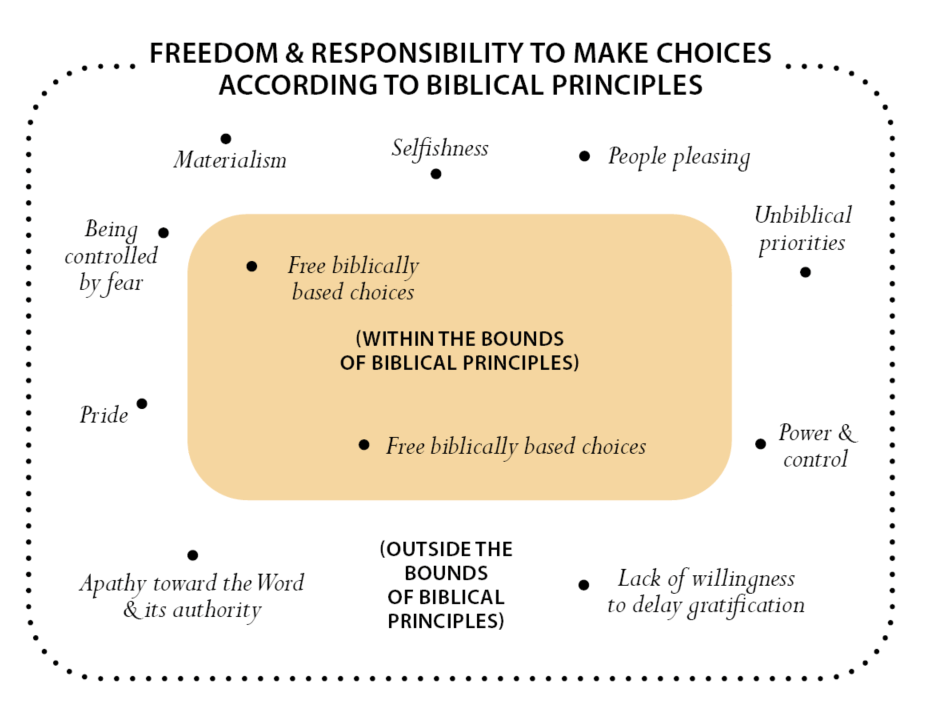Biblical Decision Making Part 3: Freedom & Responsibility
God has given us the freedom and responsibility to make wise decisions that are within the bounds of the Word.
In his sovereignty, God has chosen to give human beings a free will, intellect, experiences, examples, and abilities with which to make decisions. God has given man dominion over creation and has asked us to be stewards of it. Sometimes Christians experience significant anguish when they try to identify God’s will in circumstances where God gives us the freedom of choice.
Conversely, we must not be cavalier about our choices; decisions have consequences, both positive and negative. As it says in Gal. 6:7-8, “Be not deceived; God is not mocked: for whatsoever a man soweth, that shall he also reap. For he that soweth to his flesh shall of the flesh reap corruption; but he that soweth to the Spirit shall of the Spirit reap life everlasting.” There are consequences for actions and decisions that can last long into the future. One of the most difficult areas of decision-making is balancing freedom and responsibility.
In an effort to depict this balance, the following graphic shows how God has provided the believer with the responsibility to stay away from evil yet has given us freedom to make choices once we are operating within the safe zone. Picture life as a “canvas.” We are commanded to keep our actions responsibly within the canvas of God’s principles from his Word and avoid unbiblical behaviors which are outside of the frame. Within the canvas, there is freedom to make many types of decisions. God crafts the decisions we make within his canvas into a beautiful “workmanship” (Eph. 2:10) for his glory. This visual can be used to show the balance between freedom and responsibility in decision making.

Because biblical decision making is an important and often challenging task, we must approach it with right thinking. It is critical to view walking by faith and using Godly wisdom as interrelated instead of viewing them as an “either-or” scenario. This distinction will help avoid the twin errors of over-spiritualizing or using worldly wisdom. Interpreting Scripture in context and not depending on signs allows us to rightly divide the Word. Finally, God has given us both the freedom to exercise choice and the responsibility of stewardship according to the tenets of his Word. We are called to balance these two aspects.
PRINCIPLES FOR BIBLICAL DECISION MAKING
As we have discussed the proper lenses to use when viewing biblical decision making, we can move on to several key principles to keep in mind when making decisions. These principles can provide a framework to help ensure our decisions are being made in a manner which reflects both wisdom and faith.
God’s Word as the Foundation.
God’s Word provides the foundation for all biblical decision-making. Clearly, our life and all of our decisions need to be consistent with what God has revealed in the Word. The Word is a lamp unto our feet and a light unto our path (Ps. 119:105). As Jesus challenged his listeners in John 14:15, “If ye love me, keep my commandments.”
Through divine inspiration, God’s Word was written exactly how he wanted. It is trustworthy and complete. He could have chosen to write it in any way he wanted. He didn’t accidentally forget to add information he wanted us to have. This includes information we often wish was in the Bible ranging from when to buy a car, how to make decisions about marriage or a career, or the perfect method to raise teenagers! We do not know why God chose to put some things in the Bible and not others. However, it does seem he is much more interested in our reliance on him and his Word and who we are becoming than in us feeling completely certain about our circumstances. God desires our faith and trust in him and his Word throughout our lives over certainty and clarity. Therefore, consider the Bible as authoritative; diligently give attention to reading, meditating, and applying its teachings and principles.
2 Tim. 3:16-17, “All scripture is given by inspiration of God, and is profitable for doctrine, for reproof, for correction, for instruction in righteousness: That the man of God may be perfect, thoroughly furnished unto all good works.”
Heb. 4:12, “For the word of God is quick, and powerful, and sharper than any twoedged sword, piercing even to the dividing asunder of soul and spirit, and of the joints and marrow, and is a discerner of the thoughts and intents of the heart.”
The meaning of God’s word never changes, and the depth of the Word is marvelously endless. This allows God’s Word to speak differently to us at different times even though the meaning has not changed. We change and our experiences change. Therefore, we will see meaning and application in God’s Word which has always been there but appears new to us as we see it through a different lens of experience. Sometimes we read a passage for encouragement; other times, that same passage will admonish. We may receive a specific message for a certain situation in life or get some general direction or guidance from reading the Word. Sometimes we learn something new; other times, the Word reminds us of something previously learned. We must guard against letting our own preconceived ideas of what we wish or fear the Bible would say to distort the true message of the Word as we apply its principles accurately and in context.
Application: Consider how we view the Bible regarding decision making. Do we view it as holding the highest truth and forming the foundation for life? Or do we view it as a “cookbook” or “vending machine” to give us answers when we follow the correct formula? Make sure to spend adequate time reading and studying the Bible for the humble purpose of better understanding who God is and what his principles are.
To view the complete PDF, click here.
To download & print the bookmark, click here.





Comments
Leave a Comment